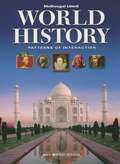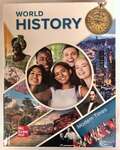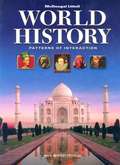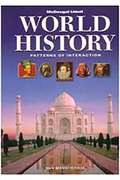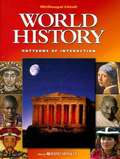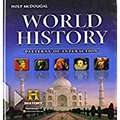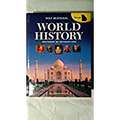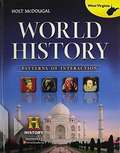- Table View
- List View
World History, Patterns of Interaction
by Larry S. Krieger Roger B. Beck Linda BlackNIMAC-sourced textbook
World History, Student Edition
by Jackson J. SpielvogelStudents can explore history through an abundance of primary and secondary sources showcasing multiple perspectives, investigate Essential Questions, and make vital connections between the past and present. Compelling questions for each topic that encourage deep thought and reflection. Inquiry-infused content that incorporates a variety of perspectives. Activities that help students engage with present-day issues and affect change locally through informed action.
World History: Ancient Civilizations
by Fredrik Hiebert Christopher P. Thornton Jeremy McInerneyNIMAC-sourced textbook
World History: Ancient Civilizations Through the Renaissance
by Kylene Beers Richard Shek Stanley M. BursteinNIMAC-sourced textbook
World History: Ancient Through Early Modern Times
by Douglas Carnine Carlos Cortés Kenneth CurtisNIMAC-sourced textbook
World History: Ancient Through Early Modern Times
by Douglas Carnine Carlos Cortés Kenneth CurtisNIMAC-sourced textbook
World History: Connections To Today
by Elisabeth Gaynor Ellis Anthony Esler Burton F. BeersA book that can be used as a tool to master world history.
World History: Connections to Today, The Modern Era
by Elisabeth Gaynor Ellis Anthony Esler Burton F. BeersThis book makes it easy to figure out what you really need to know about world history. Each section starts with Reading Focus questions that point out the most important ideas in that section. Case Studies on Contemporary Issues provide hands-on, project-based examination of key issues in the world today.
World History: Continuity and Change
by William Travis Hanes Holt Rinehart Winston StaffWorld History: Continuity and Change presents historical information from the perspective of three key ideas fundamental to human history throughout the world. These ideas provide a basis for analyzing and evaluating past events. The first key idea is that civilization resulted from individual and group efforts to survive by adapting to the physical environment, adopting new behaviors if necessary as the environment itself changed. The second key idea is that as self-aware beings, humans try to ensure not only their physical well-being but also their emotional and spiritual well-being. The third key idea is that the more flexible human beings are in responding to changing circumstances, the more likely they are to survive.
World History: Modern Student Edition
by Elisabeth Gaynor Ellis Anthony EslerNIMAC-sourced textbook
World History: Patterns Of Civilization
by Burton F. BeersA textbook history of the world focusing on the development of various civilizations.
World History: Patterns Of Interaction Oklahoma
by McDougal LittelWhile historical events are unique, they often are driven by similar, repeated forces. In telling the history of our world, this book pays special attention to eight significant and recurring themes. These themes are presented to show that from America, to Africa, to Asia, people are more alike than they realize. Throughout history humans have confronted similar obstacles, have struggled to achieve similar goals, and continually have strived to better themselves and the world around them.
World History: Patterns of Interaction
by Larry S. Krieger Roger B. Beck Linda Black Phillip C. Naylor Dahia Ibo ShabakaNIMAC-sourced textbook
World History: Patterns of Interaction
by Larry S. Krieger Roger B. Beck Linda Black Phillip C. Naylor Dahia Ibo ShabakaNIMAC-sourced textbook
World History: Patterns of Interaction
by Larry S. Krieger Roger B. Beck Linda Black Phillip C. Naylor Dahia Ibo ShabakaA textbook for students about world history.
World History: Patterns of Interaction
by Larry S. Krieger Roger B. Beck Linda Black Phillip C. Naylor Dahia Ibo ShabakaThis book pays special attention to eight significant and recurring themes. These themes are presented to show that from America, to Africa, to Asia, people are more alike than they realize.
World History: Patterns of Interaction
by Larry S. Krieger Roger B. Beck Linda Black Phillip C. Naylor Dahia Ibo ShabakaHistorical events are unique, they often are driven by similar, repeated forces. In telling the history of our world, this book pays special attention to eight significant and recurring themes. These themes are presented to show that from America, to Africa, to Asia, people are more alike than they realize. Throughout history humans have confronted similar obstacles, have struggled to achieve similar goals, and continually have striven to better themselves and the world around them.
World History: Patterns of Interaction
by Larry S. Krieger Roger B. Beck Linda Black Phillip C. Naylor Dahia Ibo ShabakaBeginnings of Civilization, New Directions in Government and Society, An Age of Exchange and Encounter, Connecting Hemispheres, Absolutism to Revolution, Industrialism and the Race for Empire, The World at War, Perspectives on the Present.
World History: Patterns of Interaction
by Larry S. Krieger Roger B. Beck Linda BlackNIMAC-sourced textbook
World History: Patterns of Interaction
by Larry S. Krieger Roger B. Beck Linda BlackWorld history textbook
World History: Patterns of Interaction
by Larry S. Krieger Roger B. Beck Linda BlackLent has traditionally been a time for self-denial and penitence, a time to examine the baser aspects of human nature. But the church increasingly recognizes that this negative focus does not always build a relationship with God, especially among women who already struggle with issues of worth and self-esteem. In its wide range of writings, Gifts from Within invites women to spend the time of Lent focusing on their uniqueness and on the gifts of their feminine spiritual nature. This collection points the way for women to deepen their ability to recognize God's love and to live as God directs. Starting with Ash Wednesday and ending on Easter Day, each day's meditation explores an aspect of women's lives, their unique spirituality, and their heritage in the biblical stories. By connecting their own stories-some sad and some joyous-with the biblical texts, readers of these devotions may find Lent to be a time of inspiration instead of merely something to be endured.

